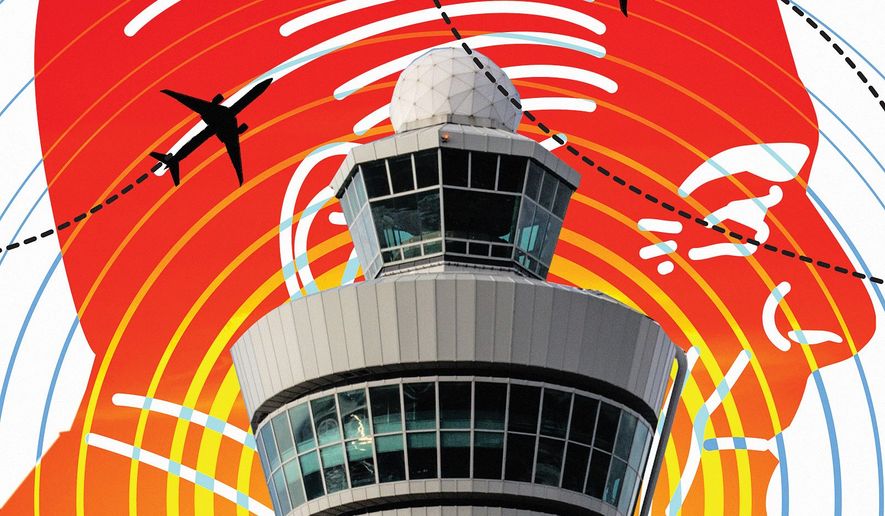OPINION:
Forty years ago this week, President Ronald Reagan fired 11,345 striking air traffic controllers who had ignored a court order to return to work and banned them from federal service for life. It was a defining moment early in his presidency.
Two days earlier, on August 3, 1981, the Professional Air Traffic Controllers Organization (PATCO) union declared a strike. President Reagan considered the strike a “peril to national safety” and ordered air traffic controllers back to work under the terms of the Taft–Hartley Act. That morning, he stated: “Let me read the solemn oath taken by each of these employees, a sworn affidavit when they accepted their jobs: ’I am not participating in any strike against the Government of the United States or any agency thereof, and I will not so participate while an employee of the Government of the United States or any agency thereof.’”
President Reagan went on to say about the striking air traffic controllers, “they are in violation of the law, and if they do not report for work within 48 hours, they have forfeited their jobs and will be terminated.” When only 1,300 of the nearly 13,000 controllers bothered to show up for work two days later, he followed through with his warning.
The members of PATCO had endorsed Mr. Reagan during the 1980 election, so his actions were not political punishment. Plus, Mr. Reagan had once been a union leader when he served as the president of the Screen Actors Guild. On the day of the firing, he said, “I’m sorry. I’m sorry for them. I certainly take no joy out of this.”
The union broke the law, and he was going to take action. Little did President Reagan and his team know, at the time, the impact his firm actions would have on both domestic and foreign policy.
Former Chair of the Federal Reserve Paul Volcker called the strike and the President’s reaction to it a “watershed” moment in the fight against inflation:
“One of the major factors in turning the tide on the inflationary situation was the controllers’ strike, because here, for the first time, it wasn’t really a fight about wages; it was a fight about working conditions. It was directly a wage problem, but the controllers were government employees, and the government didn’t back down. And he stood there and said, “If you’re going to go on strike, you’re going to lose your job, and we’ll make out without you.” That had a profound effect on the aggressiveness of labor at that time, in the midst of this inflationary problem and other economic problems.”
It also had a profound impact on our allies and adversaries around the world. In her book “When Character was King: A Story of Ronald Reagan,” Peggy Noonan wrote: “The Soviet Union was watching. They saw how the American president dealt with a national security issue, saw that his rhetorical toughness could be matched by tough action. They absorbed this and thought about it. That’s why George Shultz, Reagan’s last and most effective secretary of state, said that the PATCO decision was the most important foreign policy decision Ronald Reagan ever made.”
In “Collision Course: Ronald Reagan, the Air Traffic Controllers, and the Strike,” Joseph A. McCartin explains how many felt “that the strike played the same role for Reagan that the Cuban Missile Crisis had played for John F. Kennedy, providing an opportunity for the president to demonstrate to the Soviet Union his strength under pressure.” He went on to write: “when Soviet leader Michael Gorbachev pursue diplomacy with Reagan that led ultimately to the Soviet Union’s peaceful dissolution ten years after the PATCO strike, some suggested that the breakthrough was made possible by what one foreign policy analyst called Reagan’s ‘PATCO style of negotiating.’”
Just before we introduced our budget repair bill in Wisconsin back in 2011, I met with my cabinet and reminded them of the PATCO strike and the actions taken by President Reagan. At the time, I thought it would be a tough battle taking on the big government union bosses. I had no idea how it would become a national issue as 14 state Senate Democrats would flee the state to block a vote on the legislation.
Eventually, we found a way around the lawmakers who had abandoned their jobs. I signed the bill into a law that became known as Act 10. Our reforms are still working today.
Much like the PATCO strike, Act 10 set the tone for the rest of our two terms in office. Even though Wisconsin is a Democrat-leaning state, we enacted some of the nation’s most positive, common-sense conservative reforms. Just like 40 years ago, our early actions set the tone for the remainder of our 8 years in office and gave us the courage to take on big and important issues.
• Scott Walker was the 45th governor of Wisconsin. You can contact him at swalker@washingtontimes.com or follow him @ScottWalker.




Please read our comment policy before commenting.